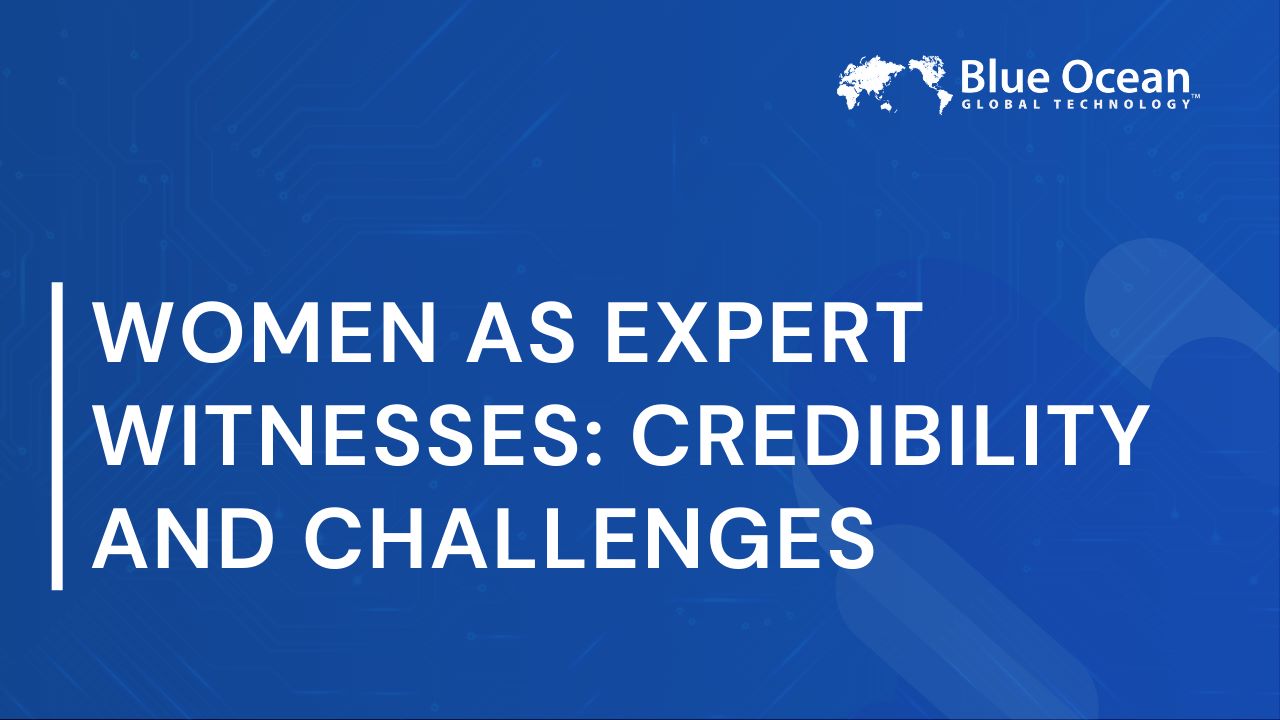Overview
- The credibility of an expert is important in determining complex cases, as judges often rely on the expert’s opinion to reach a decision.
- Unfortunately, gender bias continues to influence how the testimony of female expert witnesses is perceived.
- Attorneys may be more likely to retain male expert witnesses than female ones due to the belief, based on an unconscious bias, that a female may be less credible in court.
- By fostering inclusion and providing targeted support, more women will be motivated to participate as expert witnesses and in other high-impact legal roles.
An expert witness is an individual with specialized knowledge, skill, experience, training, or education (per Federal Rules of Evidence 702) in a particular field who is qualified to testify in legal proceedings to assist the judge or jury in understanding complex evidence or facts related to that field.
For example, in a case alleging economic harm from libel or slander, the expert should have credentials in finance or related fields that will enable them to put a credible dollar figure on the harm.
An expert witness’s primary duty is to the court, offering an opinion that is impartial and independent. Courts have guidelines for judging the methodologies of experts. Under the bright-line Frye standard, for instance, the methodologies must be generally accepted by a scientific community. Under the more flexible Daubert standard, the judge determines the acceptability of the methodologies used.
Prevalence of Women as Expert Witnesses
As of 2022, female experts were appointed as the sole expert in just 10% of all expert witness cases, with an additional 26 percent seen in court along with a male expert. That is, 64 percent of cases did not use females as expert witnesses. Moreover, according to a figure widely attributed to The Expert Institute, 80% of expert witnesses chosen by attorneys are male.
There are several possible reasons for the scarcity of expert female witnesses. First, attorneys may be more likely to retain male expert witnesses than female ones due to their belief, based on an unconscious bias, that a female may be less credible in court. Empirical research is mixed on this point, with some studies (e.g., Flick and Schweitzer, 2022) showing a bias toward men and at least one study (Sievertsen and Smith, 2025) showing a bias toward women.
Biases aside, men have outnumbered women in this field for several other reasons. First, fewer women have achieved credentials in the STEM fields (science, technology, engineering, and mathematics) — a typical criterion for the role of an expert in highly litigated industries such as construction and biotech. Second, attorneys often engage experts they have previously worked with. This triggers a preference for males in networks and reduces opportunities for women. And even if women have credentials similar to their male counterparts, jurors and attorneys view them as less credible in disciplines that are stereotypically associated with men.
These odds discourage women from joining the thriving expert witness industry despite their competence and skills. But the percentage of female expert witnesses has begun to increase in recent years, with many women taking an interest in the field. Individuals and organizations have also established initiatives to support this shift. The Equal Representation for Expert Witnesses pledge, for instance, was launched to encourage more women to come forward, promote their appointment by parties, and support their professional development through mentoring.
As a result, women are starting to make their marks as expert witnesses. While they have long been more prevalent in fields such as education, healthcare, and psychology, in recent years they have begun to dominate forensic psychology, putting them in a strong position to provide expert testimony in this in-demand arena.
In the courtroom, responses to stress can vary by gender—meaning that women may experience testimony differently from men. Hence, men and women may navigate the legal system and their role as expert witnesses differently.
Attorneys strategically choose expert witnesses with due regard to the context of their case and the jurors’ perception of a certain gender. For example, in cases involving sexual harassment and assault, defense attorneys may be more inclined to retain female expert witnesses than male ones. Jurors may perceive female experts to be more empathetic, sensitive, and approachable. These qualities may enable the expert to humanize the defendant and effectively soften culpability in the minds of the jurors.
Credibility of Women as Expert Witnesses
Credibility is part of an individual’s reputation that entails the capacity of being trusted, believed, and accepted as truthful. In a legal proceeding, credibility refers to the extent to which a party is perceived to be honest and accurate. It is an important factor in determining the weight attached to a person’s testimony in court.
The credibility of an expert is important in determining complex cases, as judges often rely on the expert’s opinion to reach a decision. In assessing the credibility of an expert witness, courts often look not only at qualifications and statements, but also at demeanor and confidence. When an expert witness—or any other witness— appears evasive in responding to questions during cross-examination or is overly emotional, their testimony might be deemed less credible.

Factors Contributing to Perceived Credibility of an Expert Witness
- Academic and Professional Qualifications: An expert witness is expected to possess and demonstrate relevant certification to establish their competence in a particular legal proceeding. The expert must also show that they have the required years of experience in their relevant field.
- Experience in Providing Expert Testimony in Court. Many law firms seeking expert witnesses for their clients require that the expert have experience in answering depositions and providing testimony. Of course, for every expert, there is a first time for such events, so clearly it is not impossible to serve without such experience. Nonetheless, it is a very common requirement.
- Demeanor of the Expert During Deposition and Cross-Examination: An expert is expected to have the ability to explain complex concepts in simple terms. They must speak with confidence and composure during deposition and cross-examination. A nervous or defensive demeanor may negatively affect the perception of the expert’s credibility.
- Accuracy of Testimony: In any legal proceeding, all individuals who testify are obligated to tell the truth. An expert’s testimony, in particular, must be accurate, rational, and consistent. It must not contradict itself and should be aligned with the evidence presented in court. The conclusions of an expert must follow established or acceptable methodologies and industry practices. In the United States, the Frye standard requires that a methodology be accepted by peers. Under the Daubert standard, the methodology must be reliable and relevant (but not necessarily generally accepted). Both standards underscore the importance of adequate preparation before the case, ensuring the expert is thoroughly familiar with the facts.
- Independence: The credibility of an expert may be called into question if a personal interest or bias in the outcome of the case is perceived.
The credibility of an expert witness should ideally be determined by their knowledge, qualifications, and experience. However, gender bias continues to influence how the testimony of female expert witnesses is perceived.
The courtroom has historically been shaped by masculine norms. Assertiveness is often associated with confidence, dominance, and authority. Conversely, feminine traits such as empathy, cooperation, and emotional intelligence are frequently perceived as signs of weakness, particularly in adversarial legal proceedings. However, if a female expert witness shows assertiveness, jurors may label her as unlikable. On the other hand, if she displays warmth, she may appear as incompetent. This creates a Goldilocks dilemma for female expert witnesses that demands them to put extra effort and balance both qualities before the judge and the jury.
Female experts often face heightened scrutiny and are forced to overcome gender-based stereotypes that undermine their authority and credibility in court. In a survey conducted with 352 mock jurors, male experts were rated as more credible than women, even when their answers matched. Furthermore, research reveals that style and nonverbal cues such as female expert witnesses’ attire, cosmetics, and posture are also assessment metrics for jurors. A study published in the Journal of Forensic Science in 2023 found that women in skirt suits with closed postures were perceived as more credible than those in pantsuits and open postures. These irrelevant and superficial expectations act as an additional burden on female experts that diverts the focus from their expertise and, sometimes, negatively impacts their performance in court.

The Way Forward
In recent years, the legal profession has witnessed significant progress in gender diversity. However, barriers that limit women’s participation and recognition, particularly in expert witness roles, persist. To address these barriers, strategic steps can be taken to increase female representation in the legal profession.
Accomplished women interested in the nexus between their fields and the domain of law should be encouraged to consider service as an expert witness. However, these efforts may falter in the absence of changes in cultural mindset. Attorneys and judges must be made aware of gender stereotypes and unconscious biases through regular gender sensitization workshops and programs. Further, jurors must be carefully instructed to be mindful of such biases and counteract them during their deliberations.
By fostering inclusion and providing targeted support, more women will be motivated to participate as expert witnesses and in other high-impact legal roles. This not only benefits the legal profession but also strengthens the justice system as a whole.
Contact us today to speak with a defamation expert witness.
Explore our expert witness services for online defamation and reputation repair.












